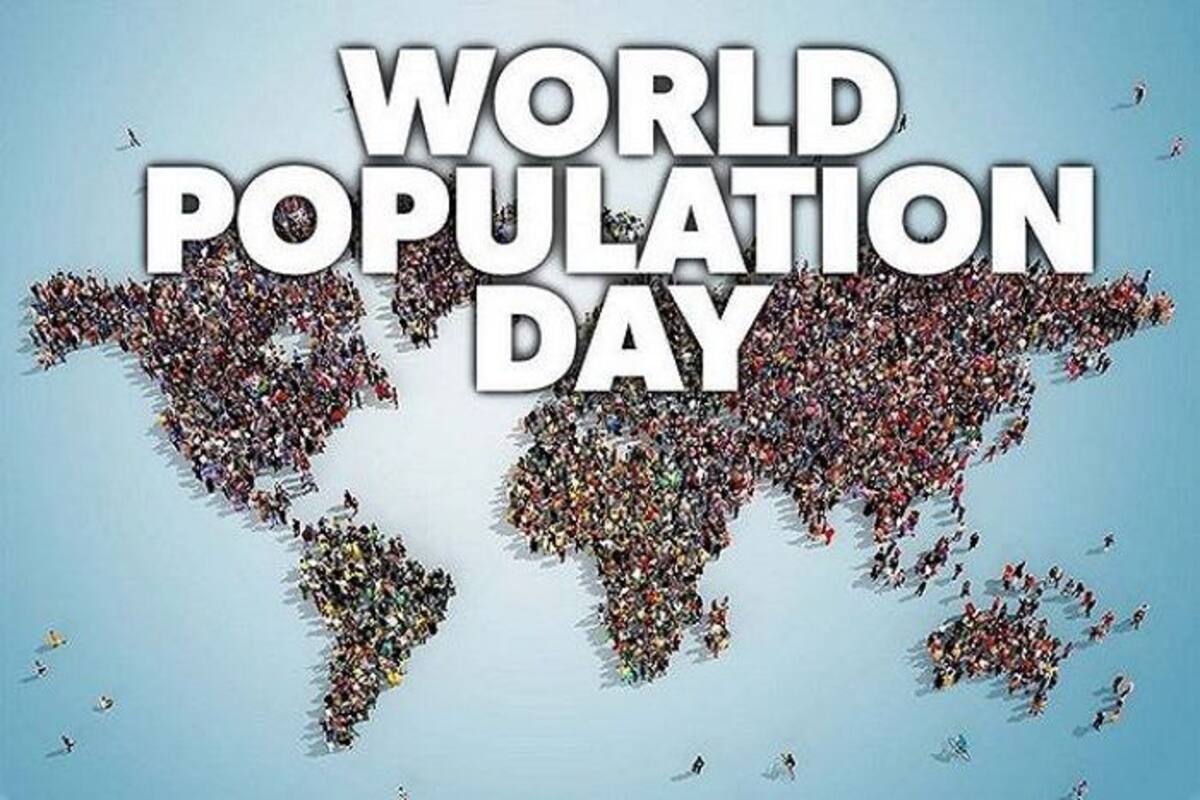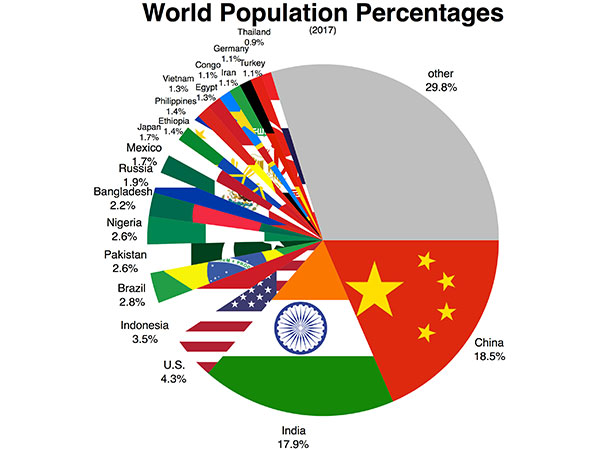HISTORY OF WORLD POPULATION DAY
Sure, you might know that there are more than seven billion people on earth right now, but how often do you stop to think about what that really means? Five Billion Day, in 1987, was meant to acknowledge the date on which the world’s population reached an estimated five billion people, which supposedly happened on July 11 of that year (hence the annual date for World Population Day). And look how much the population has increased since then! Population issues cover a lot of territories, from family planning, gender equality, and environmental impacts to human rights concerns.World Population Day was established in 1989 by the Governing Council of the United Nations Development Programme — UNDP. The inspiration for this holiday was the peaking public interest in the celebration of ‘Five Billion Day’ on July 11, 1987. This original date was decided to be set as ‘World Population Day’ by the United Nations General Assembly, and resolution 45/216 made this official in December 1990.
World Population Day serves to highlight the growing problems that come with a growing global population. Overpopulation is a crucial issue, especially considering that world resources are depleting at an unsustainable rate. Awareness about the effects of overpopulation on development and nature is emphasized. The increasing population also sheds light on health problems faced by women during pregnancy and childbirth, making the need for family planning, gender equality, and maternal health more important than ever.
The issue of population is also causing strain on society: heinous crimes are happening more than ever in the areas of gender inequality and human rights, especially in developing countries. Leadership is already doing a subpar job at taking care of its citizens, and as more people come into the world, violations such as human trafficking and child labor are increasingly becoming normal.
TRADITIONS
This event is celebrated in various countries around the world by hosting seminars and public discussions, whether virtual or at conferences. Educational sessions and workshops are also held by institutions. Slogans and banners are distributed and people post about it on social media.
World Population Trends
It took hundreds of thousands of years for the world population to grow to 1 billion – then in just another 200 years or so, it grew sevenfold. In 2011, the global population reached the 7 billion mark, and today, it stands at about 7.7 billion, and it's expected to grow to around 8.5 billion in 2030, 9.7 billion in 2050, and 10.9 billion in 2100.
This dramatic growth has been driven largely by increasing numbers of people surviving to reproductive age, and has been accompanied by major changes in fertility rates, increasing urbanization and accelerating migration. These trends will have far-reaching implications for generations to come.
The recent past has seen enormous changes in fertility rates and life expectancy. In the early 1970s, women had on average 4.5 children each; by 2015, total fertility for the world had fallen to below 2.5 children per woman. Meanwhile, average global lifespans have risen, from 64.6 years in the early 1990s to 72.6 years in 2019.
In addition, the world is seeing high levels of urbanization and accelerating migration. 2007 was the first year in which more people lived in urban areas than in rural areas, and by 2050 about 66 per cent of the world population will be living in cities.
These megatrends have far-reaching implications. They affect economic development, employment, income distribution, poverty and social protections. They also affect efforts to ensure universal access to health care, education, housing, sanitation, water, food and energy. To more sustainably address the needs of individuals, policymakers must understand how many people are living on the planet, where they are, how old they are, and how many people will come after them.
BY THE NUMBERS
7.8 billion – the current population of the world.
1,442,857,138 – the highest population rate of a country in the world — China.
1,388,712,570 – the second-highest population rate of a country in the world — India.
5 million – the estimated population of the world at the dawn of agriculture in 8000 B.C.
1800 – the year when the world population hit one billion.
200 – the projected number of years it will take for the population to double again.
2057 – the year The United Nations projects the world population to reach 10 billion.
31% – the percentage of the world population who are Christians.
23% – the percentage of the world population who are Muslims.
90 billion tons – the number of resources extracted from Earth every year.
WHY WORLD POPULATION DAY IS IMPORTANT
It touches everyone
If you live a comfortable lifestyle in a first-world country like the United States, you probably don’t think of population issues having that much of an effect on your life. However, the more people are added to the population, the more power and food is needed to sustain all of them. It’s hard to keep up that food and power production at the rate that the population is growing, and efforts to do so are contributing greatly to climate change, which affects you no matter where you live.
It asks us to look forward
World Population Day obviously reminds us to look at the current population and population issues that influence how people live now. However, it’s really focused on the future, and what efforts it will take to slow population growth. The most important thing to think of is what the world will look like for your kids, grandkids, great-grandkids, etc. if the population continues to grow at this rate.
There’s a big disparity in how population issues affect different countries
Population issues disproportionately affect people in developing countries. For instance, did you know that people in very poor countries have a life expectancy that’s about 20 years shorter than people in rich, developed countries? How about that 1/3 of population growth is due to unplanned pregnancies, which often happen when people are lacking education and family planning services? World Population Day is a good reminder to step outside ourselves and focus on these important issues.
5 AMAZING POPULATION FACTS
1.The rate at which population grows
The world population increases by about 83 million people every year.
2.A change in pattern
The population in Africa is growing, whereas the European population is shrinking.
3.Monaco has the most dense population in the world
While it is the second smallest independent state in the world, its population is a staggering 39,500, which is about 68,212 people per square mile.
4.Life expectancy is unexpectedly increasing
In 2000, the average global life expectancy was 67 years old. Fast forward 20 years, and it increased to 72.
5.Millennials make up 27% of the world’s population
About two billion people all over the world are part of this generation.
HOW TO OBSERVE WORLD POPULATION DAY
Educate yourself
There is an enormous amount of information out there about population issues, so use World Population Day to do some research. A great place to start is with the United Nations Populations Fund, the lead UN agency for tackling population issues. We know there is a wide breadth of resources, so choose a few that really interest you and take a deep dive into their problems and potential solutions.
Then share that information with your networks
As we said earlier, if you live in a developed nation, you probably aren’t that affected by population issues, at least in ways that are visible in your day-to-day life. That means your friends, family, and followers probably aren’t, either. Use World Population Day to ask people to have a good long think on these issues, and what they can do to help. If you’re posting on social media, make sure to hashtag it with #worldpopulationday.
Donate to organizations focused on population issues
There are so many amazing nonprofits and NGOs out there that are doing tough work on population issues every single day, especially in the developing world. They include organizations that educate women about contraception and family planning, ones that help people lift themselves out of poverty, and ones that help refugees that have fled their homes because of environmental issues or human rights abuses. If you are able, find ways to donate your time and/or your money to these heroic organizations.
The theme of World Population Day 2021:
The World Population Day theme 2021 is "Rights and Choices are the answer: Whether baby boom or bust, the solution to shifting fertility rates lies in prioritizing the reproductive health and rights of all people."
The theme of World Population Day 2022:
The theme for this year is “A world of 8 billion: Towards a resilient future for all – Harnessing opportunities and ensuring rights and choices for all”. As the theme suggests, there are 8 billion people living today but not all of them have equal rights and opportunities.


